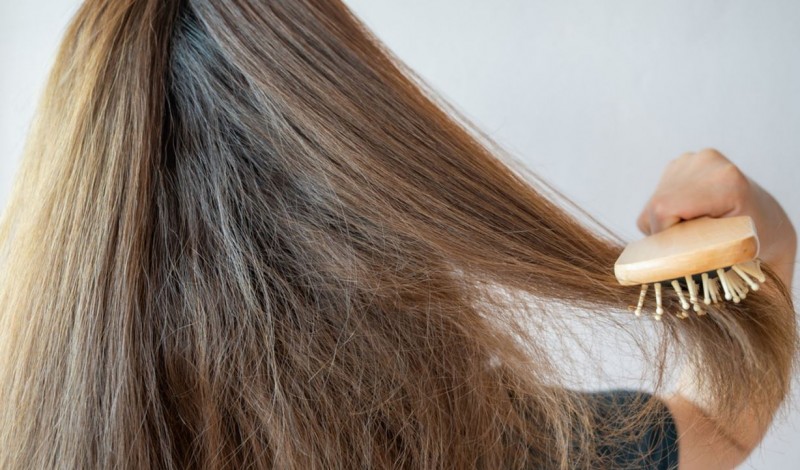
As the weather changes, the moisture in our hair starts to deplete. The cold winds make our hair dry and lifeless. To combat this issue, people often resort to using various types of serums and shampoos. However, without adequate nourishment, it becomes challenging to combat dryness effectively. In such cases, regular oil massages can help keep your hair soft, shiny, and strong. Let's explore some effective natural oils that can help combat the problem of frizzy hair. Natural oils add volume to the hair and can help deal with the effects of changing weather on both the skin and the hair. According to Payal Sinha, the founder and beauty expert of Payal Hubers, hair massages not only improve hair texture but also increase hair volume. Coconut oil is extremely effective in solving various hair problems. Boiling neem leaves and using them to wash the hair also proves to be beneficial. Moreover, natural oils are excellent for adding shine to the hair.
Here's how you can get rid of the problem of frizzy hair:
Avocado Oil: Avocado oil, rich in vitamins and antioxidants, deeply penetrates the hair shaft and scalp, moisturizing and nourishing the hair from within. Its high content of monounsaturated fatty acids and biotin helps to strengthen hair, reduce breakage, and promote hair growth. Regular application of avocado oil can also improve the overall health and appearance of the hair, leaving it softer, smoother, and more manageable.
Almond Oil: Almond oil is known for its emollient properties, making it an excellent natural moisturizer for both the hair and scalp. It contains high levels of proteins, vitamins E, B, and minerals such as magnesium and calcium, which not only nourish and strengthen the hair but also contribute to increased hair elasticity and shine. Regular use of almond oil can help reduce scalp inflammation, control hair loss, and promote the growth of strong, healthy hair.
Grape Seed Oil: Extracted from the seeds of grapes, grape seed oil is rich in linoleic acid, an essential fatty acid that promotes hair growth and overall scalp health. Its lightweight and non-greasy nature make it an ideal choice for controlling frizz and adding shine to the hair. Additionally, its high antioxidant content helps to protect the hair from environmental damage and strengthen the hair follicles, reducing hair breakage and split ends.
Coconut Oil: Known for its exceptional moisturizing properties, coconut oil is highly effective in preventing protein loss in the hair and reducing hair porosity. Its unique composition of fatty acids, including lauric acid, allows it to easily penetrate the hair shaft, nourishing it from within and leaving it smooth, lustrous, and well-conditioned. Regular use of coconut oil can also help combat dandruff, dry scalp, and fungal infections, promoting overall scalp health.
Tea Tree Oil: Tea tree oil is renowned for its powerful antifungal, antibacterial, and anti-inflammatory properties, making it a popular choice for treating various scalp conditions such as dandruff, scalp irritation, and itchiness. Its ability to unclog hair follicles and nourish the roots promotes healthy hair growth, while its soothing effects help to maintain a balanced and healthy scalp environment. Regular application of tea tree oil can leave the hair feeling refreshed, revitalized, and free from any scalp discomfort.
Before applying oil, keep in mind the following tips:
Avoid Allergies: Before applying any oil to your hair, it is essential to conduct a patch test to check for any potential allergic reactions. This involves applying a small amount of the oil to a small area of your skin, such as your hands or arms, and monitoring it for any signs of irritation or redness. By identifying potential allergies beforehand, you can prevent any adverse reactions on your scalp or skin, ensuring a safe and comfortable hair care experience.
Prevent Acne: While the application of oil can provide numerous benefits to your hair and scalp, it is crucial to avoid letting the oil accumulate on your skin, particularly on your face. Excessive oil residue on your face can clog pores, leading to the development of acne and other skin issues. It is advisable to wash your face thoroughly and use oil-free products to prevent the buildup of oil, ensuring that your skin remains clean, clear, and free from any unwanted breakouts.
Sticky Hair: Applying oil to your hair regularly can sometimes attract dust and dirt, leading to the accumulation of impurities on your scalp and hair strands. This can result in your hair feeling sticky and weighed down, affecting its overall appearance and texture. To prevent this, it is recommended to apply the oil at least an hour before washing your hair, allowing it to deeply penetrate and nourish your hair follicles while ensuring that your scalp remains clean and free from any excess oil residue.
By following these tips and incorporating the use of natural oils into your hair care routine, you can effectively combat frizzy hair and maintain healthy, lustrous hair throughout the changing seasons.
Sri Lanka: Wickremesinghe Undertakes First Cabinet Shuffle, Reassigns Health Minister's Role
From Tea Lover to Tea Slave: The Hidden Addiction You Need to Know About
Breaking the Silence: Breast Cancer Awareness Month and the Risks for Men